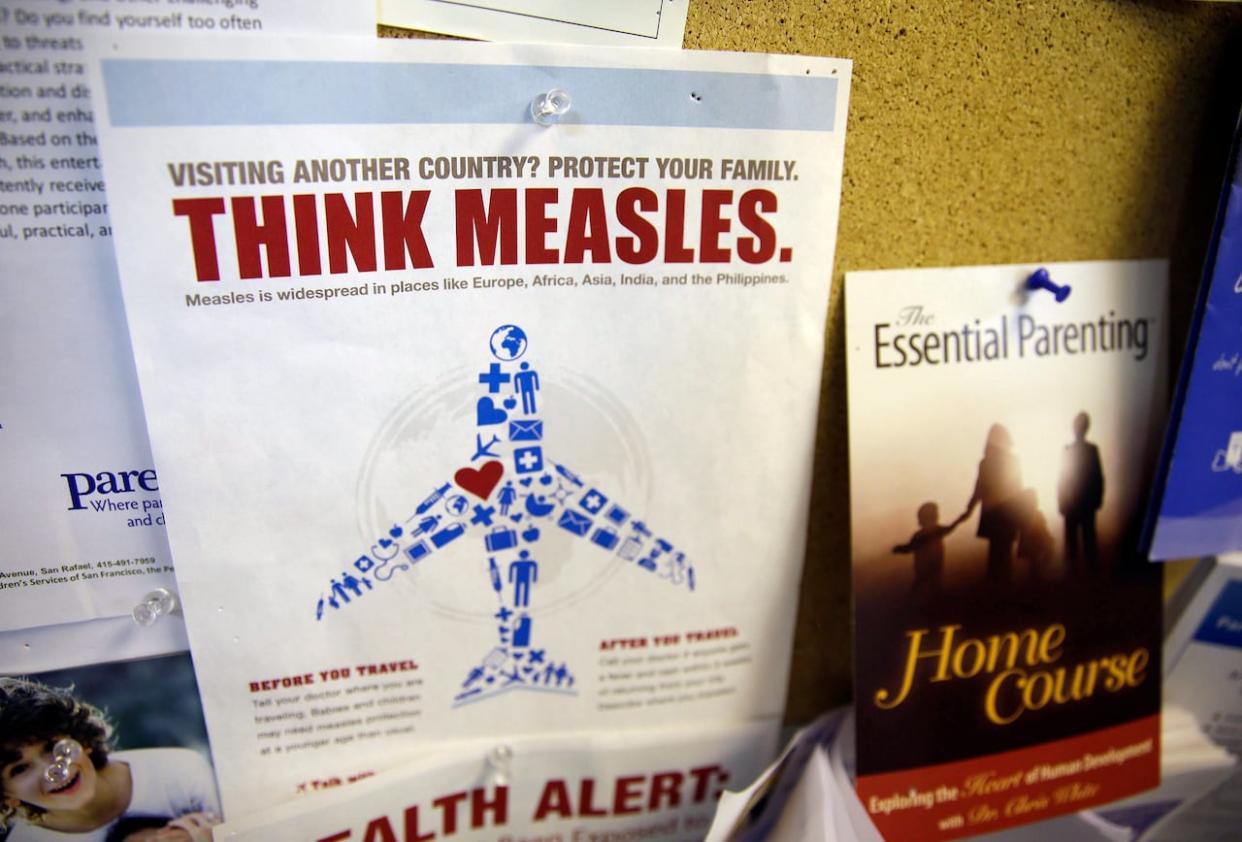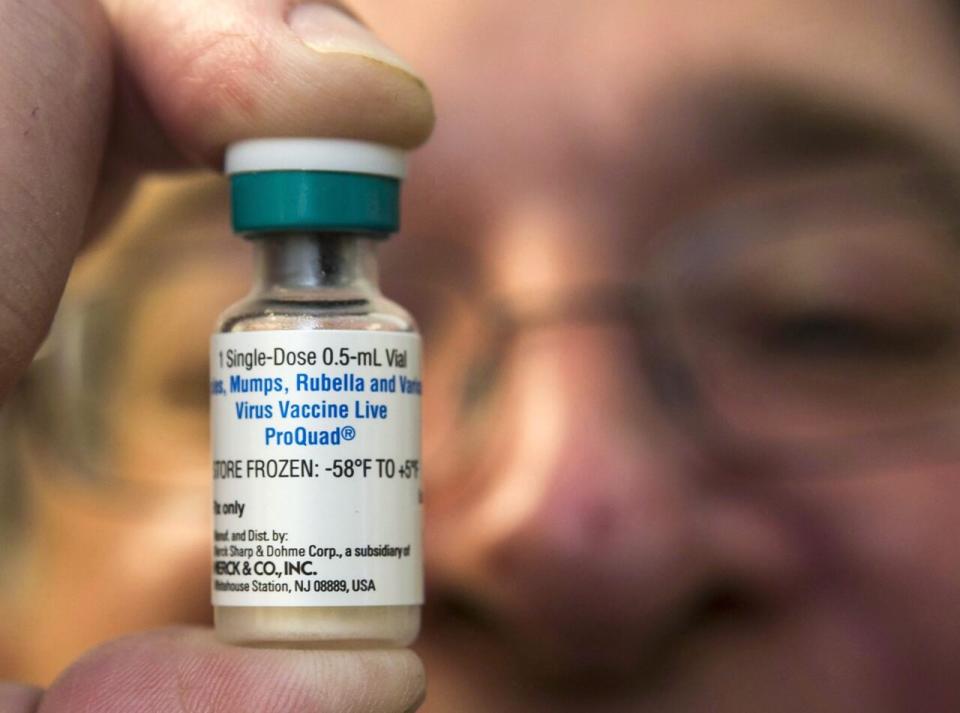N.B.'s top doctor warns of March break measles risk

With March break just days away, New Brunswick's acting chief medical officer of health is urging people to make sure they're fully immunized against measles before travelling outside the country.
Dr. Yves Léger says a global surge in measles cases, due in part to a decline in vaccinations during the COVID-19 pandemic, has him worried about the potential for travel-related cases in the province.
"We're entering a pretty busy travelling period right now, and there's concern that an individual who isn't fully vaccinated could contract the virus and import it," Léger said Wednesday.
Measles is a highly contagious disease that can cause serious illness and severe complications, including deafness, brain damage and even death.
The virus is transmitted through the air when an infected person breathes, coughs, sneezes or talks, or by direct contact with infected nasal or throat secretions.
New Brunswick's last incidence of measles — an outbreak in Saint John in 2019 that resulted in 12 cases — started through international travel. A person who had recently travelled to Europe became the province's first confirmed case of measles since 2017.
Public Health prepares for potential case
"In light of the situation that's happening across the globe, we've already started to beef up our preparations in anticipation of a potential case," said Léger. "Hopefully, there won't be, but we certainly would rather be prepared if that's the case."
Public Health officials have been reviewing their guidelines for how they manage measles cases, as well as contacts, to ensure they're up to date, he said.

Dr. Yves Léger, the province's acting chief medical officer of health, said because measles is so highly contagious, any decrease in vaccination rates 'opens up the door for measles cases to take hold and to spread.' (Government of New Brunswick/Zoom)
They've also worked with the communications branch to increase social media posts about measles and to try to encourage people to ensure they're up to date with their vaccines, especially if they're travelling.
In addition, they intend to distribute a memo to health-care practitioners soon to raise their awareness, make sure they're keeping an eye out for any potential cases, and encouraging vaccines with their patients.
"It's always better to prevent than to try and treat or to manage … outbreaks," Léger said.
Canada's top doctor urges 2 doses
His comments echo a warning issued by Canada's chief medical officer of health last Friday. Dr. Theresa Tam urged people to ensure their measles vaccinations are up to date before any international travel.
"As we head into the spring break travel season, I am concerned that the global surge in measles activity, combined with the decline in measles vaccine coverage among school-aged children in Canada, could lead to an increase in imported measles cases, potentially resulting in transmission in communities in Canada," she said in a statement.
Although measles has been eliminated in Canada since 1998, outbreaks can still occur when people who are not fully vaccinated travel to or from a country where the virus is circulating. These imported cases can lead to subsequent spread of measles in Canada among unvaccinated or under-vaccinated people, Tam advised.
6 confirmed cases in Canada
As of Friday, the Public Health Agency of Canada is aware of six measles cases in Canada, some of whom have required hospitalization. Most of the cases involve unvaccinated or under-vaccinated children who traveled internationally.
More than 90 per cent of people who are not immune to measles and who come into contact with the virus will become infected, according to Tam.
Children under five, adults older than 20, pregnant people and people who are immunocompromised are at higher risk of complications.
"I strongly advise everyone in Canada to be vaccinated with two doses of a measles vaccine, especially before travelling," Tam said.
Not too late
Ideally, the measles vaccine should be administered at least two weeks before travel, said Léger.
But it can still provide benefits if your departure is sooner, he said.
"Your body will still start to produce some immunity during that time and will hopefully provide some protection even though it's not complete protection."

Two doses of the measles vaccine are nearly 100 per cent effective at preventing infection, according to health officials. (Damian Dovarganes/The Associated Press)
Since October 1995, all children born in New Brunswick have been offered two free doses of the measles, mumps, rubella and varicella (chicken pox), or MMR, vaccine, at 12 months and 18 months of age.
Together, the doses are almost 100 per cent effective at preventing infection, according to health officials.
Nearly 92 per cent of New Brunswick students entering school in 2022-23 were immunized, the Department of Health has said.
Léger described the vaccination rate as "pretty good," but would like to see it higher.
"It's not quite meeting the national target" of 95 per cent to be able to prevent cases from spreading, he said.
Adults born before 1970 are generally considered immune to measles, through previous exposure to the virus.
The Canadian Immunization Guide recommends that adults who don't know whether they received two shots get a booster, especially if they're travelling.
Symptoms to watch for
Initial symptoms of measles may include a high fever, runny nose, cough, and red, watery or sore eyes. Tiny white spots may appear on the inside of the mouth two to three days after symptoms begin.
A red blotchy rash also appears on the face within three to seven days, then spreads to the rest of the body.
People can be infectious for up to three weeks before symptoms appear. Research suggests that one person with measles can spread it to an average of 12 to 18 others.
Most people are sick for up to 10 days and then recover completely.

 Yahoo News
Yahoo News 
